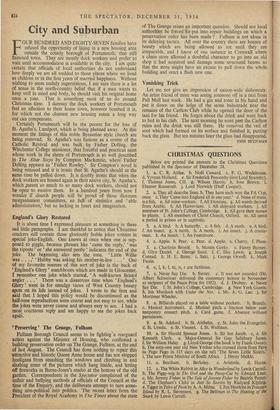City and Suburban
FOUR HUNDRED AND EIGHTY-SEVEN families have refused the opportunity of living in a new housing area outside the county borough of Portsmouth. that still flattened town. They are mostly dock workers and prefer to wait until accommodation is available in the city. I am quite certain that officials of local authorities do not understand how deeply we are all wedded to those places where we lived as children or in the first years of married happiness. Without wishing to seem unduly superstitious. I am sure there is a lot of sense in the north-country belief that if a man wants to keep well in mind and body, he should visit his original home once a year. That is something most of us do around Christmas time. I daresay the dock workers of Portsmouth feel an affection to their home town, however bombed it is, for which not the cleanest new housing estate a long way Out can compensate. • Certainly Portsmouth will be the poorer for the loss of St. Agatha's, Landport, which is being planned away. At this moment the fittings of this noble Byzantine -style church are being removed. St. Agatha's was famous as a centre of the Catholic Revival and was built by Father Dolling, the Winchester College missioncr, that forceful and practical saint whose work in the slums of Portsmouth is so well described in The Altar Steps by Compton Mackenzie, where Father Dolling appears as 'Father Rowley.' Sir Compton's novel is being reissued and it is ironic that St. Agatha's should at the same time be pulled down. It is doubly ironic that when the dock workers are housed again in their native city, St. Agatha's, which jneant so much to so many dock workers, should not be open to receive them. In a hundred years from now I wonder if church people will be proud of those diocesan reorganisation committees, so full- of statistics and 'able administrators,' but so lacking in heart and imagination.
England's Glory Restored It is about time I expressed pleasure at something in these sad little paragraphs. I am thankful to notice that Christmas crackers still contain those gloriously feeble jokes written in special joke-English. One knows at once when one is sup- posed to giggle, because phrases like 'came the reply," was the riposte' or 'she answered pertly' indicates the end of the joke. The beginning also sets tho tone. 'Little Willie was . . .." Hubby was asking his mother-in-law . . . ' One of my favourite sources of this sort of joke is the back of 'England's Glory' matchboxes which are made in Gloucester. I remember one joke which started, 'A well-known Bristol angler . . . ' There was a disastrous time when 'England's Glory' went in for smudgy views of West Country beauty spots on its lids instead 'of jokes. I wrote to the firm and said that I hoped this policy would be discontinued as the half-tone reproductions were coarse and not easy to see, while the jokes were never coarse and always easy to see. I had a most courteous reply and am happy to see the jokes back &saki.
'Preserving' The Grange, Fulham
Fulham Borough Council seems to be fighting' a rearguard action against the Minister of Housing, who confirmed a building preservation order on The Grange, Fulham, at the end of last August. The Council has done nothing to repair this attractive and historic Queen Anne house and has not stopped hooligans from smashing the windows and climbing in and slashing some of the pictures which hang inside, and letting off fireworks in Bume-Jones's studio at the bottom of the old garden. Correspondents in the Spectator complained of the unfair and bullying methods of officials of the Council at the time of the En9uiry, and the deliberate attempt to turn some- thing non-political into politics. The recent letter from the President of the Royal Academy in The Times about the state of The Grange raises an important question. Should not local authorities be forced lo put into repair buildings on which a preservation order has been made ? Fulham is not alone in its delaying tactics. All over the country there are houses of beauty which are being allowed to rot until they are irreparable, and I know of one instance in Cornwall where a chain store allowed a doubtful character to go into an old shop it had acquired and damage some structural beams so that the store might have an excuse to pull down the whole building and erect a flash new one.
Vanishing Trick
Let me not give an impression of nation-wide dishonesty. An artist friend of mine was seeing someone off in a taxi from Pall Mall last week. He had a gm and tonic in his hand and put it down on the ledge of the stone balustrade near the remains of the Carlton Club while he opened the door of the taxi for his friend. He forgot about the drink and went back to bed in his club. The next morning he went past the Carlton ruins and the drink was still there. He removed the veil of soot which had formed on its surface and finished it, putting back the glass. But ten minutes later the glass had disappeared.
JOHN BETH:MAN


























 Previous page
Previous page